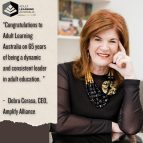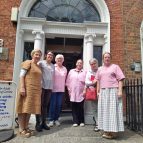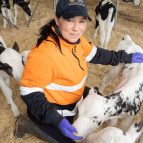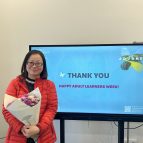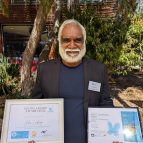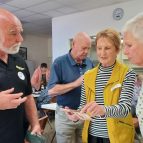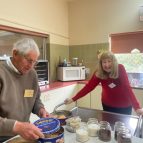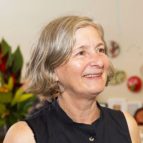A beloved learning centre under threat
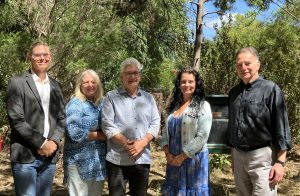 A much-loved and well-utilised adult education provider in Melbourne is facing an uncertain future because it is located on the ground floor of one of the first public housing towers scheduled to be demolished.
A much-loved and well-utilised adult education provider in Melbourne is facing an uncertain future because it is located on the ground floor of one of the first public housing towers scheduled to be demolished.
Youmei Xi originally came to North Melbourne Language and Learning (NMLL) to learn English after migrating from China. She loved the local centre so much she stayed on for other courses before becoming a volunteer. Youmei now comes in to help recent migrants, including making sure they know that the Centre provides community members with
air-conditioned spaces during severe or extreme heat.
“There are so many good people here. I enjoy being helpful and making friends,” she said.
In September 2023, then Victorian Premier, Daniel Andrews, made a surprise announcement that Melbourne’s 44 high rise public housing towers were to be demolished and redeveloped by 2051.
Built between the 1950s and 1970s, the Premier said the towers – which housed about 10,000 people – would be replaced with new homes that met contemporary building and sustainability standards.
Social housing across the sites, he said, would increase by 10 per cent, with affordable and market homes also available.
The first of three sites earmarked for redevelopment is 33 Alfred St in North Melbourne – which has been home to North Melbourne Language and Learning (NMLL) since it was set up by residents and community agencies in 1989 to provide English language classes.
Providing relevant and easy to understand information about services, NMLL, like so many other adult education providers, quickly became a vital resource in helping residents connect with local agencies.
Yang Youjian is learning English at NMLL, after moving from Northern China. As well as finding his English teacher, Rosie, to be “very kind, experienced and highly dedicated,” Yang is receiving support from Sam, another NMLL worker, to explore how he can have his
Chinese qualifications recognised in Australia.
In the decades since opening, NMLL has become a Registered Training Organisation, a Learn Local centre and a Neighbourhood House, continuously expanding its education, training, and community development programs to empower culturally and linguistically
diverse communities in the area.
Over the past seven years, more than 750 English as an Additional Language (EAL) students have attended classes, and more than 3,000 people have participated in pre-accredited courses. Last year, alone, NMLL enrolled students from 30 countries, speaking 13 different languages.
NMLL also provides free 24/7 Wi-Fi, arranges a fortnightly food market providing free fresh fruit and vegetables, and runs workshops on water safety, CPR, domestic violence, legal rights, and compulsory voting. Well-attended seminars cover topics such as women’s health, men’s health, voting and pathways to employment.
During her visit to the centre, Jenny Macaffer said that “NMLL is an essential part of this community, providing not just education but also connection, support, and
opportunity.” She added, “Its location ensures residents have easy access to learning and vital services that help them build better futures. Maintaining NMLL’s presence in North Melbourne is critical for the many people who rely on it every day.”
At the end of September, NMLL must vacate its current premises and source alternative accommodation without any ongoing rental assistance from the Victorian Government. Up until now, the Centre has had access to concessional rent because of its benefit to the local community.
CEO Cliff Rundle says that commercial rental rates would be “prohibitively high for a not-for-profit organisation like NMLL”.
“Closing NMLL will have negative repercussions for the local community now and in the future”.
What particularly worries Cliff and the Centre’s staff and volunteers is that the possible closure of the Centre will happen at a time when the local population is growing and new and planned social and private housing will significantly increase the need for adult and community education and services.
“Current and future students would no longer be able to improve their English and digital literacy skills in an affordable and accessible way and there would no longer be the range of community events,” Cliff said.
Vietnamese-born Tran moved to North Melbourne from nearby Ascot Vale after a fall left her unable to work or manage a two-bedroom flat.
Attending NMLL on Tuesday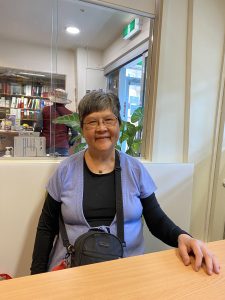 s and Thursdays helps prevent her from “staying in my flat all the time, which would be very bad.” She has made “so many friends” and learned skills she never had the opportunity to develop before.
s and Thursdays helps prevent her from “staying in my flat all the time, which would be very bad.” She has made “so many friends” and learned skills she never had the opportunity to develop before.
Cliff says that student numbers remain high in 2025, showing that NMLL’s services are just as vital as ever. He, along with staff and volunteers, remains hopeful that when they
close their
doors in September to the current centre, they will be able to assure current and prospective students that a new nearby home awaits.
Captions: Top image, l-r: Keir Paterson, CEO, Neighbourhood Houses Victoria, Jenny Macaffer, ALA, CEO, Cliff Rundle NMLL CEO, ACEVIC Executive Officer Nina Bekker and NMLL President, David Lansley.
Left: NMLL student, Tran

